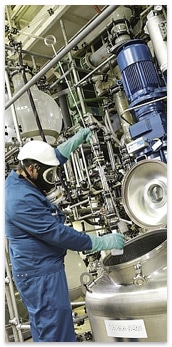
Chemical Process Development
OVERVIEW
The Chemical Process Development group has profound experience and expertise in the development of efficient processes at production scale in the field of organic, inorganic and polymer chemistry. The multidisciplinary approach of the team assures an in-depth optimization of the chemical processes on different levels.
Chemical knowledge
In close collaboration with our colleagues of the “Functional Molecular Ingredients group” (Discovery Chemistry group), a change in chemistry can be considered in order to improve the process economics, process safety, yield or product quality. Choice of reagents and solvents, addition speed and addition order, reaction kinetics, etc will all play a major role and can only be correctly assessed when the basic chemistry is understood.
Physicochemical knowledge
When it comes to scaling up chemical processes from lab to plant, major issues may arise with regard to the physicochemical properties of the reaction mixture in combination with the process equipment being used. Mixing effects, heat transfer limitations, mass transfer aspects can all play an extremely important role, often going unnoticed at first sight in the lab. The experience our Process Development group has with these issues will assure an in-depth understanding, ensuring the development of a robust and reproducible process.
Chemical Engineering
Since the Process Development group works in close collaboration with the people from Agfa’s own chemical production site, we are well aware of the limitations an existing facility may pose on your process. A thorough understanding of the process capabilities of the production site with regards to process flows, heat transfer characteristics, mixing characteristics, etc. will allow a more efficient process design.
Process safety
If a process cannot be run safely, it should not be run at all! Process safety testing is therefore an integrated part of Chemical Process Development at Agfa. Having this immediate feedback loop will guarantee that the process being designed can be executed safely from the start.
TECHNIQUES
- Literature Search Published technical literature as well as Agfa internal documentation is considered.
- Parameter screening Parameters such as temperature, choice of solvent or concentration can be screened with dedicated process simulation equipment on small scale (scale 10 to 100 ml). This rapid screening can narrow the focus to the parameters that really matter for your process.
- Design of Experiments (DOE) This statistical technique is used routinely to get the largest amount of data from a limited number of experiments. Using this approach is a great help in the design of robust and reliable processes.
- Reaction calorimetry Reaction Calorimetry is used as a process safety assessment tool, but also as a process analytics tool, giving extra information on the reaction kinetics governing your process.
- Scaling-up The process development group has in-house access to reactors ranging from 100 ml over 2 and 10 liter all the way up to industrial Buchi setup of 60 liters. Furthermore, access to Agfa’s production facility is possible, where processes can be run on a scale from 100 to 4000 liter.
- Technology investigations We have experience in the design of distillation process, filtration and centrifugation processes, high shear mixing processes, etc.
EQUIPMENT AND METHODS
- Lab scale synthesis at different scale in classical glassware (50 mL – 2 liter)
- Small scale parallel synthesis RS10 (20 mL scale)
- Easymax synthesis workstation (Mettler, 2 * 100 mL reactor, automated with overhead stirring, -40 to +180 °C)
- Optimax synthesis workstation (Mettler, 1 * 1000 mL reactor, automated with overhead stirring, -40 to +180 °C)
- Argonaut Advantage parallel synthesis workstation (4 * 250 mL, automated with overhead stirring)
- Lab scale jacketed glass reactors (4 – 10 liter, overhead stirring)
- Semi-industrial Buchi reactors (17 – 60 liter, temperature control, overhead impeller stirrer, distillation capacity,…)
- Filtration at different scales : glass filter, Nutsche filter, pressure filter
- Lab scale decanter centrifuge
- Drying cabinets
Let's Talk
Fill out this form, and we'll revert to you as soon as possible.
Please provide a detailed description of your question or request.
